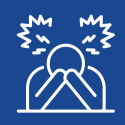Insights from the Latest "Stress in America" Report
In the ever-evolving mental health landscape, staying current on the latest research and trends is essential for providing adequate care to your clients. One such invaluable resource is the American Psychological Association’s annual “Stress in America” report, which offers profound insights into stress and its impact on individuals nationwide. Launched in 2007, this annually published report synthesizes data from surveys conducted nationwide, offering a comprehensive overview of stress levels among Americans and the factors influencing them.
The “Stress in America” report comprehensively examines stress levels among Americans, shedding light on various factors contributing to stress, including work, finances, health, and societal issues. Published annually by the American Psychological Association, this report synthesizes data from nationwide surveys, providing a nuanced understanding of the stressors affecting different demographic groups. This report is a helpful tool for your practice. It can enhance your ability to understand and address the complex needs of your clients.
As a mental health provider, you are no strangers to stress’s profound impact on individuals’ well-being. The aftermath of the last few years (i.e., the COVID-19 pandemic, global conflicts, racism, racial injustice, inflation, and climate-related disasters) has brought about unprecedented challenges, amplifying stress levels across society. The latest findings illuminate the enduring psychological effects of this collective trauma, urging us to delve deeper into understanding and addressing the post-pandemic landscape of stress.
The results of the 2023 “Stress in America” survey conducted by The Harris Poll paint a stark picture of the psychological toll inflicted by the last few years. Contrary to a superficial perception of life returning to normalcy, psychologists warn that we’re grappling with the aftermath of a collective trauma with profound implications for mental and physical health. Summarized below are some of the noteworthy findings from this year’s report.

Increased Chronic Health Conditions and Mental Health Diagnoses: The survey highlights a concerning trend: a significant rise in reported chronic health conditions and mental health diagnoses since the onset of the pandemic. In particular, adults aged 35 to 44 experienced a notable increase in both categories, underscoring the pervasive impact of sustained stress on overall well-being.

Financial and Economic Stressors: Financial strain has emerged as a predominant stressor for many, with adults aged 35 to 44 citing money and the economy as significant sources of stress. This underscores the ripple effects of economic instability, exacerbating stress levels and perpetuating a cycle of financial worry.

Downplaying of Stress and Barriers to Treatment: Despite the alarming rise in stress levels, many individuals tend to downplay their experiences, citing reasons such as the belief that their problems aren’t “bad enough” or “others have it worse” to warrant stress or barriers to seeking treatment. This reluctance to acknowledge and address stress underscores the need for heightened awareness and accessible mental health support.

Difficulty Managing Stress: A significant portion of adults, comprising 36%, expressed uncertainty about how to begin managing their stress, while 33% reported feeling consistently overwhelmed by stress despite their efforts to cope. A substantial majority of adults, accounting for 66%, indicated they felt they needed more emotional support in the past year, with 26% specifying a considerable need for additional assistance. Additionally, 44% of adults stated that they don’t feel understood by others regarding their stress, and over half, totaling 52%, expressed a desire for someone to offer guidance and support during challenging times.

Gender Differences: Over decades of meticulous observation, clinical psychologist Rosalind S. Dorlen, PsyD, ABPP, has consistently found that women report higher levels of stress than men, a trend supported by the latest data showing women consistently reporting higher average stress levels and a greater likelihood of rating their stress as significantly high. Women face a myriad of stressors, from financial worries to family obligations and societal pressures, often feeling overwhelmed by these burdens. Societal expectations and gender roles exacerbate these stress levels, especially for professional women who navigate career advancement while managing home responsibilities and often feel unsupported by male partners, further impacting their mental health. Research highlights the stark differences in how men and women experience and cope with stress: women tend to internalize stress, leading to a higher risk of physical and mental health disorders. In contrast, men often externalize stress through aggression or impulsivity. These findings underscore the complex and nuanced manifestations of stress across genders.

Discrimination and Disparities: A significant portion of adults cite personal safety (39%) and discrimination (27%) as substantial stressors, with many attributing discrimination to factors such as age, race, or gender. LGBTQIA+ adults and those with disabilities face heightened levels of discrimination and discomfort in voicing their experiences, often feeling excluded from their communities. Racial and ethnic disparities also persist, with Black and Latino/a/e adults more likely to experience discrimination and feel uncomfortable discussing it. Despite openness to discussing various topics, many individuals refrain from discussing stress related to discrimination. Furthermore, stress often impedes individuals’ desire to take action to better their communities, particularly impacting marginalized groups. These findings highlight the need for increased awareness, support, and action to address discrimination and its impact on mental health and well-being in diverse communities.
In light of the findings above, mental health providers must recognize the various forms post-pandemic stress can take and adjust interventions accordingly. The “Stress in America” report provides valuable insights into the enduring effects of recent years on our collective well-being. It’s crucial for providers to acknowledge and integrate these insights into their practice to support clients. Moreover, it’s essential for providers to reflect on how the past few years have personally affected them and what resources they have to prioritize self-care.
To effectively tackle the current stress landscape, a comprehensive approach is essential. Mental health providers are crucial in translating insights from the report into interventions that promote resilience, well-being, and societal change. By integrating trauma-informed approaches and addressing societal stressors, providers can better support clients in overcoming challenges and achieving optimal mental health. It’s vital to educate clients about the psychological impacts of the pandemic and equip them with resilience-building skills. Additionally, advocating for systemic changes to address root stress causes and ensure equitable access to care is imperative. Collaborating with policymakers and community stakeholders is crucial in implementing meaningful reforms that benefit individuals and communities. By embracing empathy, resilience, and advocacy, we can compassionately navigate the current stress landscape, fostering healing and renewal.
In conclusion, the “Stress in America” report by the American Psychological Association serves as a vital tool for mental health providers navigating the complex landscape of stress and its impact on individuals and communities. This comprehensive annual report synthesizes nationwide survey data, offering valuable insights into the various stressors affecting different demographic groups. By integrating the findings from this report into their practice, providers can enhance their ability to understand and address the diverse needs of their clients. Additionally, the report sheds light on the enduring effects of recent years, such as the COVID-19 pandemic and societal upheavals, underscoring the urgent need for tailored interventions and systemic changes to support mental well-being. Through empathy, resilience, and advocacy, providers can help clients navigate the challenges of post-pandemic stress with compassion and effectiveness, fostering healing and renewal. Embracing trauma-informed approaches, addressing societal stressors, and promoting self-care are essential components of this endeavor. By collaborating with policymakers and community stakeholders, mental health providers can contribute to meaningful reforms supporting the well-being of individuals and communities.
References
American Psychological Association. (2023). Stress in America: Stress in America 2023
A Nation Recovering from Collective Trauma. Retrieved from https://www.apa.org/news/press/releases/stress/2023/collective-trauma-recovery
Blog Post Tags:
Related Blog Posts
Related Learning Labs
Related Resources
.
- Buscar Tratamiento de Calidad para Trastornos de uso de Sustancia (Finding Quality Treatment for Substance Use Disorders Spanish Version)
- Finding Quality Treatment for Substance Use Disorders
- Focus On Prevention: Strategies and Programs to Prevent Substance Use
- Monthly Variation in Substance Use Initiation Among Full-Time College Students
- The National Survey on Drug Use and Health (NSDUH) Report: Monthly Variation in Substance Use Initiation Among Adolescents








